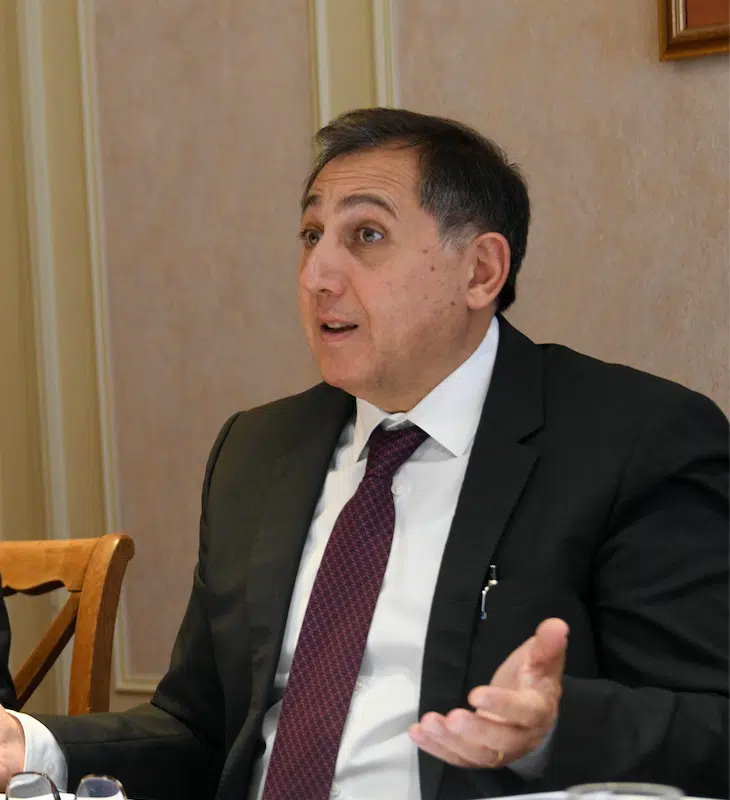The French-Armenian website Armenews has published an article by Doctor of Legal Sciences, Judge of the European Court of Human Rights (2015-2025) Armen Harutyunyan, which is presented below in translation.
“Throughout its history, every nation forms a system of national symbols based on its own history and cultural heritage. At the foundation of this entirety lie the people’s cultural and civilizational codes, which form their national identity. History testifies that it is precisely these codes and identity that sustainably ensure the existence and development of a people, both in historical and cultural dimensions. Undoubtedly, statehood contributes to identity development, yet it is evident that a people can survive even without a state, but not without identity.
Analysis of Azerbaijani President Aliyev’s speeches and policies clearly shows that his goal is the destruction of all foundations that sustain Armenian identity.
In this context, it seems that the current policy pursued in the Republic of Armenia is sometimes directed toward the gradual alienation of the Armenian nation from its historical, cultural, and spiritual roots. An alienation that, regardless of its motivations, threatens to weaken the continuity of identity and collective memory.
Read also
Attacks directed against the Armenian Apostolic Church, denial of cultural heritage and historical memory, as well as fostering divisions within the diaspora, promote this alienation. It is evident that continuation of such a policy may deprive Armenia of its historical-cultural and spiritual foundations, weakening its identity.
The currently sought “peace” should not lead to forced transformation of national identity, but on the contrary, should aim to preserve the people’s memory and cohesion based on national solidarity and justice.
After losing the perception of its own history, a weakened Armenia can easily be directed toward “peace” under any conditions—full of external, territorial, or ideological concessions.
How is alienation from identity expressed?
- Gradual renunciation of one’s own historical-cultural heritage by considering “Western Armenia” and “Western Azerbaijan” on the same level.
- Renunciation of unifying national symbols, for example, Mount Ararat.
- Growing tension with institutions embodying historical continuity, such as the Armenian Apostolic Church.
- Weakening of the Diaspora-Armenia connection and fragmentation of national unity.
- Adoption of external narratives in the Nagorno-Karabakh issue with the danger of forgetting Armenian history.
- Placing the Armenian Genocide issue in a non-primary historical dimension and adopting the Turkish false narrative.
- Gradual renunciation of the ideology of Armenian statehood and historical continuity.
The method of diverting the people: destruction of public discourse and conscious degradation of political culture
The impoverishment of public debate and the growth of internal divisions divert Armenian society from fundamental issues concerning Armenia’s security, sovereignty, and cultural future. As a result of these processes, societal despair and disappointment form, leading to low levels of electoral participation, weakening democracy and the legitimacy of elections.
This is exactly what occurred during the recent local government elections in Yerevan, when approximately 70 percent of voters did not participate in voting. Under the conditions of the remaining 30 percent, with the support of administrative resources, the government can ensure its reproduction.
The policy of excessive concessions encourages aggression
A policy expressed through weakness or unilateral concessions encourages the continuation of external pressure. Azerbaijan continues to maintain confrontational and hostile rhetoric, which severely complicates the process of balanced peace.
The Azerbaijani regime builds its internal legitimacy on propaganda of hatred toward Armenians. In Aliyev’s imagination, the Azerbaijani must constantly think about “Armenian enemies.” Chauvinism and ideological fanaticism are permanent tools for all dictatorships, and from this perspective, Aliyev is no exception. For this very reason, peace with Armenia is a mortal danger for him.
This is precisely why Azerbaijan’s state budget finances the so-called “Western Azerbaijan Community” and demands its “return” to “historical territories.”
Thus, institutionalized Armenophobia in Azerbaijan serves as a political tool, allowing Aliyev’s government to divert its own people from the country’s socio-economic problems, forming internal legitimacy based on hatred.
All this can only be countered with a peace policy guided by firm political will—not at the cost of appeasing the dictator and destroying the institutions of the Republic of Armenia and the diaspora that ensure Armenian vitality, but directed toward protecting one’s own country from unjustified and aggressive attacks.
Certainly, a bad peace is preferable to a good war. However, peace can exist only under conditions of mutual respect for identities.
Therefore, the issue is not finding the guilt of political figures, but preserving Armenia’s spiritual, cultural, and historical sovereignty while simultaneously building the foundations of genuine and lasting peace.”
Armen Harutyunyan
Doctor of Legal Sciences, Professor, Judge of the European Court of Human Rights (2015-2025)





















































